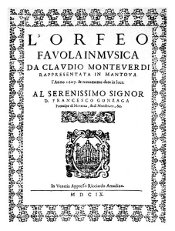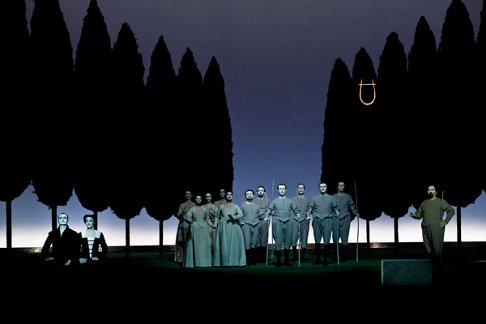Recently in Reviews
English Touring Opera are delighted to announce a season of lyric monodramas to tour nationally from October to December. The season features music for solo singer and piano by Argento, Britten, Tippett and Shostakovich with a bold and inventive approach to making opera during social distancing.
This tenth of ten Live from London concerts was in fact a recorded live performance from California. It was no less enjoyable for that, and it was also uplifting to learn that this wasn’t in fact the ‘last’ LfL event that we will be able to enjoy, courtesy of VOCES8 and their fellow vocal ensembles (more below …).
Ever since Wigmore Hall announced their superb series of autumn concerts, all streamed live and available free of charge, I’d been looking forward to this song recital by Ian Bostridge and Imogen Cooper.
The Sixteen continues its exploration of Henry Purcell’s Welcome Songs for Charles II. As with Robert King’s pioneering Purcell series begun over thirty years ago for Hyperion, Harry Christophers is recording two Welcome Songs per disc.
Although Stile Antico’s programme article for their Live from London recital introduced their selection from the many treasures of the English Renaissance in the context of the theological debates and upheavals of the Tudor and Elizabethan years, their performance was more evocative of private chamber music than of public liturgy.
In February this year, Albanian soprano Ermonela Jaho made a highly lauded debut recital at Wigmore Hall - a concert which both celebrated Opera Rara’s 50th anniversary and honoured the career of the Italian soprano Rosina Storchio (1872-1945), the star of verismo who created the title roles in Leoncavallo’s La bohème and Zazà, Mascagni’s Lodoletta and Puccini’s Madama Butterfly.
Evidently, face masks don’t stifle appreciative “Bravo!”s. And, reducing audience numbers doesn’t lower the volume of such acclamations. For, the audience at Wigmore Hall gave soprano Elizabeth Llewellyn and pianist Simon Lepper a greatly deserved warm reception and hearty response following this lunchtime recital of late-Romantic song.
Collapsology. Or, perhaps we should use the French word ‘Collapsologie’ because this is a transdisciplinary idea pretty much advocated by a series of French theorists - and apparently, mostly French theorists. It in essence focuses on the imminent collapse of modern society and all its layers - a series of escalating crises on a global scale: environmental, economic, geopolitical, governmental; the list is extensive.
For this week’s Live from London vocal recital we moved from the home of VOCES8, St Anne and St Agnes in the City of London, to Kings Place, where The Sixteen - who have been associate artists at the venue for some time - presented a programme of music and words bound together by the theme of ‘reflection’.
'Such is your divine Disposation that both you excellently understand, and royally entertaine the Exercise of Musicke.’
Amongst an avalanche of new Mahler recordings appearing at the moment (Das Lied von der Erde seems to be the most favoured, with three) this 1991 Mahler Second from the 2nd Kassel MahlerFest is one of the more interesting releases.
‘And there was war in heaven: Michael and his angels fought against the dragon; and the dragon fought and his angels, And prevailed not; neither was their place found any more in heaven … that old serpent … Satan, which deceiveth the whole world: he was cast out into the earth, and his angels were cast out with him.’
If there is one myth, it seems believed by some people today, that probably needs shattering it is that post-war recordings or performances of Wagner operas were always of exceptional quality. This 1949 Hamburg Tristan und Isolde is one of those recordings - though quite who is to blame for its many problems takes quite some unearthing.
There was never any doubt that the fifth of the twelve Met Stars Live in Concert broadcasts was going to be a palpably intense and vivid event, as well as a musically stunning and theatrically enervating experience.
‘Love’ was the theme for this Live from London performance by Apollo5. Given the complexity and diversity of that human emotion, and Apollo5’s reputation for versatility and diverse repertoire, ranging from Renaissance choral music to jazz, from contemporary classical works to popular song, it was no surprise that their programme spanned 500 years and several musical styles.
The Academy of St Martin in the Fields have titled their autumn series of eight concerts - which are taking place at 5pm and 7.30pm on two Saturdays each month at their home venue in Trafalgar Square, and being filmed for streaming the following Thursday - ‘re:connect’.
The London Symphony Orchestra opened their Autumn 2020 season with a homage to Oliver Knussen, who died at the age of 66 in July 2018. The programme traced a national musical lineage through the twentieth century, from Britten to Knussen, on to Mark-Anthony Turnage, and entwining the LSO and Rattle too.
With the Live from London digital vocal festival entering the second half of the series, the festival’s host, VOCES8, returned to their home at St Annes and St Agnes in the City of London to present a sequence of ‘Choral Dances’ - vocal music inspired by dance, embracing diverse genres from the Renaissance madrigal to swing jazz.
Just a few unison string wriggles from the opening of Mozart’s overture to Le nozze di Figaro are enough to make any opera-lover perch on the edge of their seat, in excited anticipation of the drama in music to come, so there could be no other curtain-raiser for this Gala Concert at the Royal Opera House, the latest instalment from ‘their House’ to ‘our houses’.
"Before the ending of the day, creator of all things, we pray that, with your accustomed mercy, you may watch over us."
Reviews

11 Oct 2009
Orfeo at La Scala
Robert Wilson staged Salome at La Scala in 1987, installing a troop of student actors on the stage to enact some sort of abstract action flow that had no discernible relationship to the Salome libretto, meanwhile sung by concert dressed opera stars huddled on a corner of the stage.
Had the Kent Nagano pit not been appallingly lackluster perhaps some chance illuminations of the Strauss score might have been struck, as was Mr. Wilson’s intention.
Just now, 22 years later Mr. Wilson has struck out again, this time with Monteverdi’s Orfeo, a few distinguished early music singers exercising abstracted hand and arm gestures and stilted dance movements, and a well-known Wozzeck screeching Orfeo in whiteface. Had Rinaldo Alessandrini not been in the pit there would have been no flashes of the Monteverdi genius, and as it was these were reduced to a very few.
The Alessandrini Monteverdi trilogy at La Scala has been eagerly anticipated, particularly after his sublime cycle of Monteverdi madrigals (complete) at the Edinburgh Festival two years ago. Mo. Alessandrini brings a restoration to these old scores much as faded and mutilated Renaissance paintings are imbued with vibrant original line and color through restoration. In the visual arts this is accomplished by complicated scientific process, in the spheres of music Alessandrini must rely on his dramatic intuitions.
He finds infinite colors and timbres to the narrower tones of old instruments and to the whiter production of the human voice. He hones the vowels, carves the consonants and sculpts the phrases of a pristine Italian, and he drives its rhythms and tempos to embrace larger periods. He generates the precise moment when emotion bursts into syllable and sentence. Under Alessandrini’s baton the Monteverdi word does indeed become the Orphic moment.
Robert Wilson is an architect. The art of architecture, it is said, is frozen music. He chose a Titian painting, Venus with Eros and an Organist, as his visual metaphor for the world’s first great opera. In the painting two small forests of cypress trees nearly converge in a strong perspective that carries our erotic imagination suggestively beyond the foreground dominated by a lush female nude scrutinized by the male organist twisting around from his keyboard.
 Scene from Orfeo [Photo by Marco Brescia - La Scala Photographic Archives]
Scene from Orfeo [Photo by Marco Brescia - La Scala Photographic Archives]
In Wilson’s version exactly twelve perfectly shaped trees are carefully frozen into a perspective space through his characteristic hard edge, sculptural lighting. Wilson replaces Titian’s sumptuous foreground nude and the leering organist with his Orpheus who dominates the foreground, rushing back and forth across the stage apron. Titian’s pastoral nudity was replaced by the off-white costumes (the flesh color of Titians’ Venus) that generically covered the shepherdesses and made the shepherds comically plumb-shaped rather than sveltely swain-shaped.
The familiar characters of this well-known myth were presented as elaborately dressed Renaissance mannequins who moved from frozen gesture to frozen gesture, Monteverdi’s tumbling torrents of words stopped in their tracks by Wilson’s motionless visuals. The Messaggera who delivers the emotional account of Euridice’s death was Sara Mingardo, known for her fine recordings with Rinaldo Alessandrini and his Concerto Italiano that have earned her the reputation as the Maria Callas of early music. But for her extended second act monologue she was straight-jacketed by the staging and by a formless black dress, Alessandrini’s simple organ continuo unable to breath life into this great moment of early opera, sadly lost in the vast spaces of this huge theater.
Austrian baritone Georg Nigl was Orfeo. Though a credentialed early music singer he is better known on major European stages as a Wozzeck. He has a sizable voice and persona that is well able to fill large theaters. He lacks both a beautiful voice and a sympathetic presence, thus he was unable to project the strong humanity that overflows much mannerist art and particularly these emotionally heightened Monteverdi monologues. Uniquely, Wilson afforded him the only dynamism allowed on the stage, keeping him prominently moving in the foreground of the stage picture. His positioning on the stage apron sometimes activated acoustical quirks in the Scala auditorium, creating echos that heightened the freakishness of his detached note ornamentations.
Left to his own devices, Alessandrini shone in the sinfornie and the orchestral ritornelli, and very nearly got the extended madrigal that closes the second act into the spheres of great music. Other than the discomfort apparent in Mr. Nigl’s delivery of the Italian language, much of the beauty of the language was present in the otherwise Italian cast, though the finely detailed Musica of early music star Roberta Invernizzi was lost in the Wilson staging and in the vastness of La Scala. The Pluto of Giovanni Battista Parodi and the Proserpina of Raffaella Milanesi made no effect, while the Caronte of Luigi de Donato was buried under a silly costume. Only among the solo shepherds were there occasional glints of real, live performances.
Robert Wilson made important theatrical discoveries, and his innovations have enlivened our ideas of theater. He established his moment in the last third of the twentieth century, and is now working to preserve his legacy through the creation of his foundation. Given the formidable scope of his upcoming projects it is apparent that the foundation has become his atelier, and that projects like this Orfeo are stamped out in his mold. The sense of theatrical discovery that was once at the heart of his work was not present in his staging of this opera.
Rinaldo Alessandrini is the man of the moment, his discoveries of new depths in old music have uncovered musical vistas yet to be explored in both old and new music. This new sense of music theater deserves an original staging, one that hears this music, a staging that explores the excitement of Mo. Alessandrini’s discoveries rather than forces them into a dated mold.
Michael Milenski

